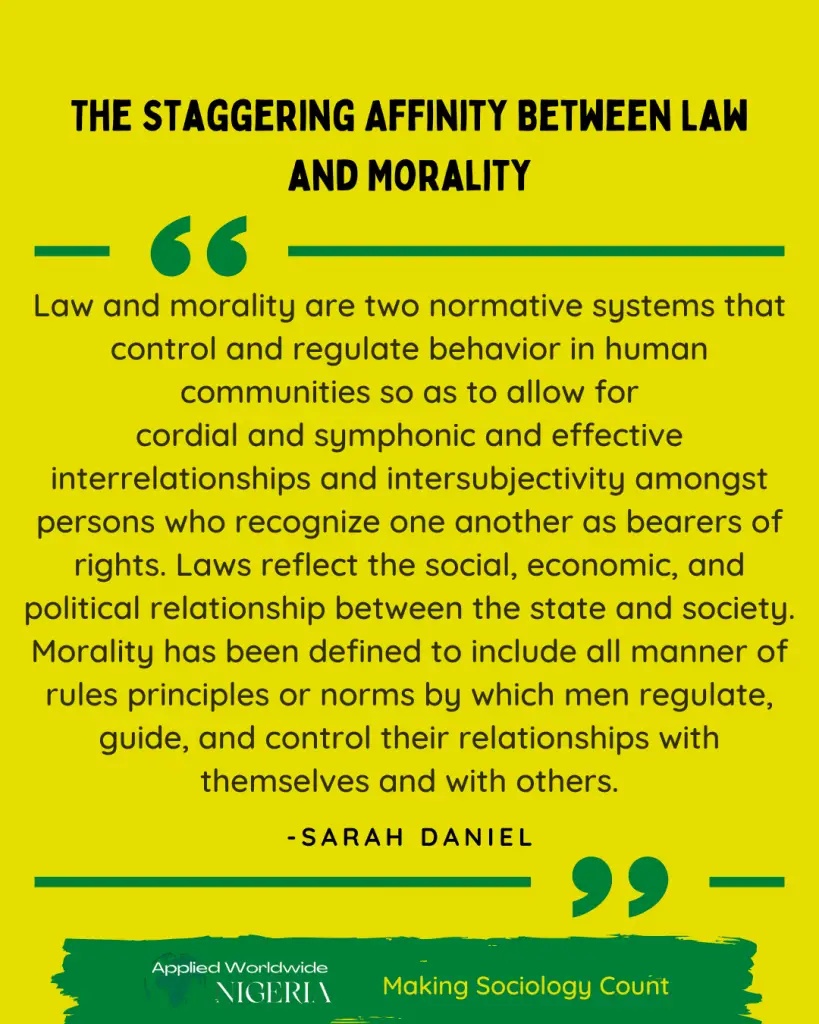
Ever since the law has been recognized as an instrument of social control, there has been an ongoing debate
on its relationship with morality. Law and morality have demonstrated an intimate link and are related to each other. Various laws have existed to satisfy the moral desire of society.
Law and morality are two normative systems that control and regulate behavior in human communities so as to allow for
cordial and symphonic and effective interrelationships and intersubjectivity amongst persons who recognize one another as bearers of rights. Laws reflect the social, economic, and political relationship between the state and society. Morality has been defined to include all manner of rules principles or norms by which men regulate, guide, and control their relationships with themselves and with others.
Variations of the Law
The law is perceived from two main views. Natural law and legal positivism. Natural law is of the view that laws are valid when they are in line with a certain higher authority over man. This can be God, according to Thomas Aquinas, or even a shared morality amongst society as viewed by Lon Fuller.
Whereas positivism, as poised by John Austin in his book “The Province Of Jurisprudence Determined,” is the view that law is only valid if it is made by the right practice of the state creating the law (e.g. laws passed through parliament) it does not matter if we like these laws, just as long as they are made using the right process.
Morality on the other hand is often determined by the will of other humans rather than the law itself. It is a set of standards and code of conduct we as a people have set to ourselves to determine what is morally right or wrong. Although we can see that there are cases of both the law reflecting morality and the law not reflecting certain moral judgments, we still need to ask whether it is required of the law to reflect morality. Law aims at the smooth functioning of society. Today, the law can be identified without
reference to morality, except where the law accepts the moral criteria for creating it.
Conflict of Opinion Between Law and Morality
Morality comes and appears from an individual’s conscience and the values of society, therefore what morality means to an individual might not necessarily be acceptable to another. It is therefore very cumbersome to create a law when there is a conflict of opinion as morality always defer from individual to individual. However, morality cannot always be on the back of every statue. If something is immoral, it does not certainly make it illegal, and vice versa. Scenarios like this give rise to the question of whether
we have a general moral obligation to obey laws simply because they are laws. This is an important question with very important implications. If we have a general moral obligation to obey the law then this applies to every law even bad laws.
According to Jeremy Bentham in his book “Introduction to the principles of Morals and Legislation”, legislation has the same center as morals, but not the same circumference. Morality is generally the bases of law, i.e illegal (murder, theft) is also immoral. But there are so many immoral acts such as sexual relationships between two unmarried adults, ingratitude, etc which are immoral but are not illegal.
Slavery was once legal, but was and still is immoral. On a much more trivial level, it’s illegal to walk through a pedestrian stop light, but not, unless dangerous, immoral. In the same vein, there are laws that are not based upon morals and some of them may even be opposed to morals e.g. laws on technical matters, traffic laws, etc. In sun, Bentham thought that although adultery is morally wrong and subject to moral sanction, it should not be legally punished because the harm of the punishment outweighs its benefits.
Harm Principle
Harm principles say that every person should be set free to act according to their will or desire but the act must not be compromised with the desire of other people or cause harm to the other person. John Stuart Mill in his book “on liberty” argued that “the only purpose for which power can be rightfully exercised over any member of a civilized community against his will is to prevent harm to others”. As such, laws before being enacted have to agree with the harm principle, a fair compromise between
legality and morality.
Influence of Morals on Law
Law and Morality act and react upon and shape each other. In the guise of ‘justice’, ‘equity’, ‘good faith’, and ‘conscience’, morals have been incorporated into the hems of law. Such as in judicial law making, in the interpretation of legal precedents, and in exercising judicial discernment (as in awarding punishment). Moral considerations play a very important role. Morals work as a refrainment upon the power of the legislature because the legislature cannot venture to make a law that is completely against the morals of society.
Secondly, all human conduct, interactions, and social relationships cannot be regulated and governed by the law itself. A considerable number of them are regulated by morals. A number of actions and relations in the life of the people go on very smoothly without any intervention by law. Their observance is secured by morals. So far as the legal rules are concerned, it is
not the legal sanction alone that ensure their obedience but morals also help in it. Thus, morals perfect the law.
Critical Analysis
There are certain sensitive issues where the law and morals differ. For example, gender equality is for law, whereas gender equity is for morality. In such cases, which should prevail and have the binding power, law, or morality? The same applies to the instances of abortions and homosexuality. If a person believes in a certain act and later on, the state comes with a law making it binding, that law will become a morally justified law for that person because he was already an admirer of that behavior.
However, it will be difficult for those, who will acknowledge it, only after came into being as binding. It may prove troublesome for those people, but they must follow the rules. Such a situation should be curtailed from society because it equates the law and morality to the same footing, which in reality are different. Some scholars argue that nothing is legal unless it passes a test of morality. Law ensures consistency to the code of behavioral law and it is essential as it cannot completely ignore the ethical and moral aspects. If there are laws, not up to the standards of ethical behavior, such laws cannot survive in contemporary states.
Generally, in the form of justice, good faith, equity, and conscience, morality has been inserted into the law. And the legislature has to be cautious at the time of incorporating law because an act or stipulation cannot be inserted into statutes, which is contrary to the morals of the society. But in the court of law, when it comes to technicalities, often morals disappear. Legal rules are a synthesis and are derived from heterogeneous sources.
In Nigeria, if we examine all legal perspectives, we shall find that some of them have come from personal laws and local customs. A good number of them are based on foreign rules and principles (mainly English), while some are based on logic or political ideology and so on. Secondly, ‘public opinion’ which greatly influences law is made up of a number of things – political ideas, economic theory, ethical philosophy, etc. These, directly and indirectly, influence law. Therefore, when so many elements work in shaping the legal precepts, the matter cannot be put in such a simple way as the ‘relation between law and morals, because a number of factors join hands in influencing law, and morality is only one of them.







